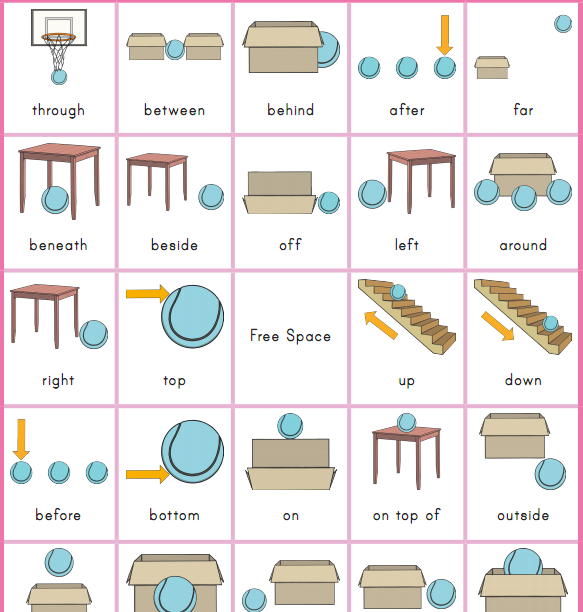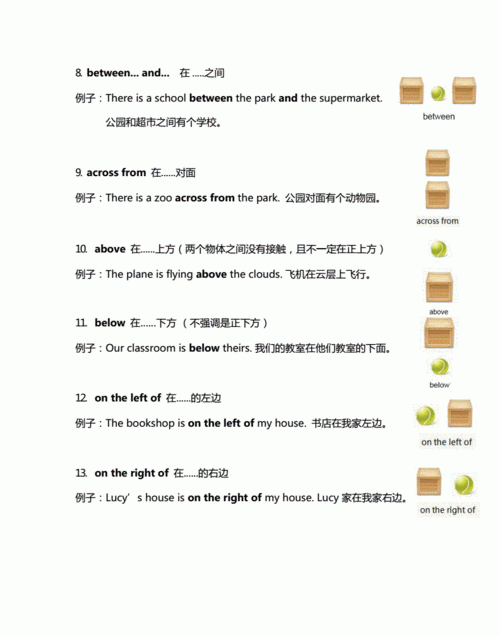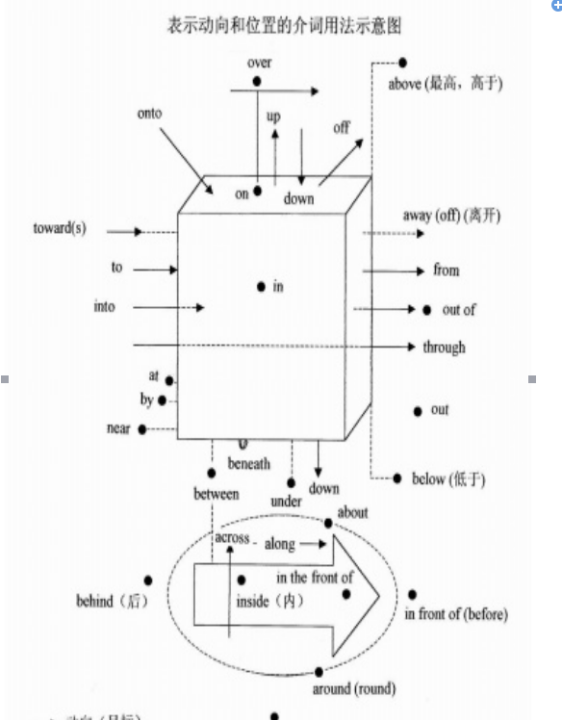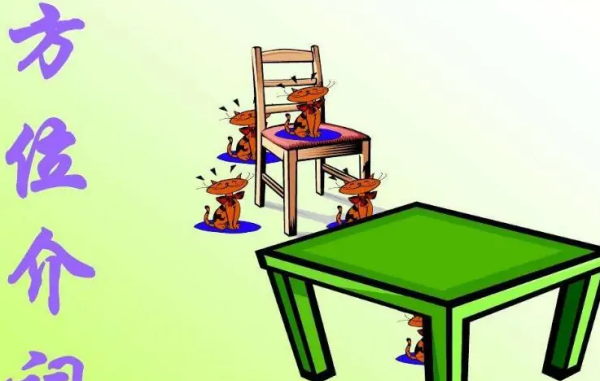本文目录
英语,表示东南西北的介词用法
1.intheeastof,inthewestof,inthenorthof,inthesouthof:表示在范围里。
2.ontheeastof,onthewestof,onthenorthof,onthesouthof:表示在范围外,相邻。
3.totheeastof,tothewestof,tothenorthof,tothesouthof:表示在范围外,不相邻。

小学需要掌握的英语介词以及用法有哪些
表示时间的介词称为时间介词.表示时间的介词有:at, on, in, before, after等.
一、at, on和in
① at 表示:(在(某时刻、时间、阶段),在……岁时)
My cousin joined the army at fifteen.
我表哥十五岁参的军.
② on 表示:在(某日),在周末,在……节日
He was born on the 15th of August in 1769.
他出生于1769年8月15日.
③ in 表示:在……事后,在……期间,在……年/月
She went to America in 2000.
她2000年去了美国.
at, on 和in 作时间介词的比较:
① at 表示具体时间点.
② on 后可以跟表日期、星期、节日的词,还可以指具体某一天的早、中、晚.
③ in 泛指一天的早、中、晚,还可以表示一段时间,如:周、年、月、季节等.
二、before和after
① before 表示:在……之前 before eight o’ clock 八点之前
Spring comes before summer.
夏天之前是春天.
② after 表示:表示……之后 after lunch 午饭之后
Come to my office after school.
放学后请来我办公室.
表示做某事的方法、手段的介词有by, with, in, at, on.
一、by
by表示:用,以,靠,通过……方式.by表示手段时后接动作或制作方式.“by + 交通工具”表示交通方式.
by bike 骑车 by bus 坐公车 by taxi 搭出租
by train 坐火车 by ship 乘船 by air 坐飞机
Linda usually goes to work by subway.
琳达通常做地铁上班.
She makes a living by teaching.
她考教书谋生.
二、with
with 表示:用,以.with表示手段时,后接工具、材料或具体内容.
write with a pen 用钢笔写
eat with knife and fork 用刀叉吃
see with one’s eyes 用眼睛看
I killed the fly with a swatter.
我用苍蝇拍打死那只苍蝇.
She cut the cake with a knife.
她用刀切开了蛋糕.
三、in
in 表示:用,以.in表示用某种方式,如:颜色、笔墨、语言、声音、服饰等.
speak in English 用英语说
talk in a high voice 高声说话
I wrote a letter in ink.
我用钢笔写了一封信.
Try to express yourself in English.
试着用英语表达一下.
表示空间的介词有:at, in, on, over, above, under, below 等表示静态位置的介词和from, to, up, down, through, across 等表示动态方向的介词.
一、at, on 和 in
① at 表示:(地点、位置)在……
② on 表示:(位置)在……上面
③ in 表示:(地点、位置或空间)在……里,在……中,在……上
Her fans have arrived at the airport.
她的影迷已经到达了机场.
Look at the picture at the top of the page.
请看以下这一项上面的图片.
Is my pen on the desk or in the desk?
我的钢笔是在桌子上还是在抽屉里呢?
Some kids are playing in the yard and others are playing in the room.
有些孩子在院子里玩,其他则在房间里玩.
at,on 和 in 作空间介词的比较
① at用于表示一个较小的场合,这个地点被当作一个点来看待.
② on 表示在某一平面或线上,强调与某物体有接触.
③ in 表示在较大的地方,在某立体空间或平面范围之内.
二、about 和 around
① over 二者都表示:在……周围/各处,围绕.但
② above about强调无方向.
We walked about in the town.
我们在城里到处游逛.
Dudu is running around the fence.
嘟嘟在绕着篱笆跑.
Let’s plant trees around the house.
让我们在房子周围栽上树.
三、over 和 above
① under 表示:在……正上方,越过
② above 表示:在……上方
I saw a wood bridge over the river.
我看见河上有座木桥.
Look! Some birds are flying above the clouds.
看!一些鸟儿在云朵上飞翔.
over和above作空间介词的比较
① over强调在某人或某物的正上方,而且两物体表面没有接触.
② above 强调位置上某物体的上方,并不一定是正上方,而且两物体表面也没有接触.
四、under 和 below
① under 表示:在……的正下方
② below 表示:在……下方
Please read the words below the picture.
请读图片下面的文字.
Look! A big mouse hides under the armchair.
看!一只大老鼠躲在扶手椅下面.
under 和 below 作空间介词的比较
① under 强调在某物的下方,完全覆盖两物体表面可以接触也可以不接触.
② below 强调位置低于某参照物,但并不一定是正下方.
五、between 和 among
① between 表示:(位置、时间、数量等)在……之间(两者之间)
② among 表示:在……中间(三者或三者以上之间)
I often fly between Beijing and Shanghai.
我经常在北京和上海之间飞来飞去.
Come here between eight and nine o’ clock.
请把点到九点之间过来.
Susan is among the crowd.
苏珊是人群当中.
六、into 和 out of
① into 表示:进来
② out of 表示:出去
Get out of the room.
从房间里出去!
Bob walked into the room.
鲍勃走进房间.
He is working in the office.
她在办公室里工作.
七、behind 和 in front of
① behind 表示:在……后面
② in front of 表示:在……前面
There is a fountain in the front of the park.
公园的前面有一个喷泉.
Susan sits in front of me and Dudu sits behind me.
苏珊坐在我前面,嘟嘟坐在我后面.
八、up 和 down
① up 表示:往上,向……顶上
② down 表示:往下,沿着……往下
The monkey is climbing up the tree.
猴子正在往树上爬.
Tears ran down her face.
眼泪从她的脸上流了下来.
九、across 和 through
① across 表示:穿过,跨过
② through表示:穿过,通过
There is a bridge across the river there.
那儿有座桥横跨在河上.
A train is running through the tunnel.
一列火车正从隧道中穿过.
十、by 和 near
① by 表示:在……旁边
② near 表示:在……附近
Come over here and stand by me.
过来站在我旁边吧.
We are planning to camp by the lake.
我们打算到湖边露营.
There are some big apple trees near the house.
房子附近有一些大苹果树.
The new hospital is near our school.
新医院里我们学校不远.
十一、其他空间介词
① along 表示:沿着,顺着
② to 表示:到……,去……,向……
Let’s walk along the street.
让我们沿着街散散步.
We drove along the freeway.
我们驱车沿着高数公路行驶.
The child pointed to the polar star.
那孩子指着北极星.
I’m going to the bakery.
我想要去那家糕饼店.
*第一个to表示“指”的方向、目标.
第二个to表示到达的目的地.
除了按上面介绍表示时间关系、空间关系、方式、手段等的介词外,还有一些重要的介词:
一、of 的用法
① of 表示:……的(表示所属、所有关系)
a cover of this book
这本书的封皮
a friend of my parents
我父母的一个朋友
② of 表示:……之中的(表示部分)
some boys of the team
小组里的几个男生
the end of the story
故事的结尾
Two students of our class joined in the match.
我们班里的两个同学参加了这场比赛.
All of us approved his plan.
我们全都赞成他的计划.
③ of 表示:……份/量的,……的种类的(表示量、种类)
a drop of water
一滴水
a pair of shoes
一双鞋
I want two cups of coffee.
我要两杯咖啡.
二、with 的用法
① with 表示:具有,有……的,随身带着
It is a dog with black spots.
它是一只长着黑色斑点的狗.
Take an umbrella with you.
带把雨伞吧!
② with表示:和……一起,同……一起,偕同
I went to Disneyland with my mother.
我和妈妈一起去了迪斯尼乐园.
Jane likes to play with Mimi.
简喜欢和咪咪玩耍.
③ with 表示:随着……
The wine improves with age.
这种酒越陈越香.
I get up with the sun every day.
我每天日出就起床.
三、for 的用法
① for 表示:为了……(表示目的、用途、利益)
Give me a knife for cutting bread.
给我一把切面包的刀子.
I’ve found it for you.
我已经为你找到了它.
What can I do for you?
我能为你做些什么吗?
② for 表示:一段距离或时间
He has run for a mile.
他跑了一英里.
I’ve studied in Beijing for three years.
我在北京学习三年了.
Please bake the cake for 40 minutes.
请将蛋糕烤四十分钟.
③ for 表示:因为,由于(表示原因)
Thank you for your help.
谢谢你的帮助.
Andy jumped for joy at the good news.
安迪听到这个消息高兴的跳了起来.
We could hardly see for the mist.
由于大雾,我们几乎看不见了.
四、like 的用法
① like表示:像……(一样),似……(一样)
They are like brothers and sisters.
他们情同手足.
② like 表示:是什么样子,怎样
Andy looks just like his father.
安迪和他爸爸像极了.
五、from 的用法
① from 表示:(时间或场所)从……,自……
We work from Monday to Friday.
我们周一到周五上班.
Charlie will fly from New York to London.
查理要从纽约飞往伦敦.
The cat jumped down from the top of the wall.
猫从墙头跳了下来.
② from 表示(两地的距离)离
The nearest hospital is 10 miles from my house.
最近的医院离我家十英里远.
We live about 5 kilometers from Boston.
我们住在离波士顿约五公里的地方.
③ from 表示:出自……,来自……
Did you have a (phone) call from him?
你接到他的电话了吗?
Where are you from?
你来自哪里?
Susan got a letter from her aunt.
苏珊收到一封她姨妈的来信.
六、at, about, to 和 in 的其他用法
① at 表示:对着……, 朝着……,向……(表示方向,目标)
He threw a bone at the dog.
他用一块骨头砸狗.
Please look at the blackboard.
请看黑板.
Jack shot at the deer but missed.
杰克朝鹿开了一枪,但是没有打中.
② about 表示:关于……,涉及……
He told me a story about ghosts.
他给我讲了一个鬼故事.
Don’t worry about me.
不要担心我.
They are talking about English learning.
他们在谈论英语学习.
③ to 表示:对于,给,向(表示对象)
Jane is always very kind to others.
简总是对别人很友善.
Please send some food to them.
请给他们送些食品去.
Have you told all the news to John?
你把全部的消息都告诉约翰了吗?
④ in 表示:穿着,戴着
Who is the man in black?
那穿黑色衣服的人是谁?
Tom is in a purple hat.
汤姆戴着紫色帽子.
The girl in uniform is Mary.
穿校服的那个女孩是玛丽.

英语全部方位介词翻译
常见的方位介词:above, below, under, below, behind, in front of, beside, in, on等。
(1)in front of与in the front of:
A. in front of:指在物体_______的前面。
There is a small river in front of the house.
B. in the front of:指在物体_________的前面。
There is a blackboard in the front of the classroom.
(2)above, over与on:
A. above 意为“在......的上面,高于” The map is above the desk.
B.over 意为“在......的正上方” There is thick cloud over Beijing.
C. on 意为“在......上” The book is on the desk.
(3)below与under:
A. below 意为“在......的下方,低于” The river is below the mountain. B. under 意为“在......的正下方” The ball is under the chair.
(4)behind 意为“在......的后面”
There is a garden behind the house.
(5)beside 意为“在......的旁边” There is a book beside the computer.
(6)in 意为“在......的里面” The pen is in the box.
(7)next to 意为“在......旁边” There is a shop near the hospital.

扩展资料:
有许多表示事物存在的方向和位置的介词,我们称之为方位介词。如in(在……里),behind (在……后面),down (向下)等等。其中有些方位介词的意义比较接近,在用法上很难区分,如on, over, above 都有“在……之上”的意思,但含义却不尽相同。
常见介词短语:
(一)、由介词in构成的方位介词短语
1、in the front 在前面
2、in the front row 在前排
3、in the back row 在后排
4、in the third row 在第三排
5、in front of... 在...前面(范围之外)
6、in the front of... 在...前部(范围之内)
7、in the middle在中间
8、in the street在街上
9、in the middle of...在中间
10、in the tree在树上(指在树上的小动物,鸟等外来物)
(二)、由介词at构成的方位介词短语
1、at the front of...在...所在范围的前一部分2、at the back of...在...所在范围的后一部分
3、at the foot of...在...脚下4、at the top of...在...顶部
5、at the end of...在...尽头6、at the head of...在...前头
7、at the(school)gate在(校)门口8、at the station 在车站
9、at No.2 Chang’an Road在长安路2号10、at my uncle’s 在我叔叔家
11、at home在家12、at the doctor’s在医务室/在诊所
(三)、由介词on构成的方位介词短语
1、on the right/left在右(左)边2、on one’s right/left在某人的右(左)边
3、on the desk/table在课桌/桌上4、on the right-hand/left-hand side在右/左手边
5、on the blackboard在黑板上6、on/in the wall在墙上/里
7、on the paper在纸上8、on the tree在树上(指树上长的,结的东西)
参考资料:百度百科:英语介词
-5年级的方位介词
方位介词歌:
in里面on上面;
above 上方不要忘;
under在下beside旁;
between 夹在两者间,还有behind后面藏, 前面位置很重要;
in front of要记牢。

介词是英语学科中介词语法的一种,指代方位的介词。在初中英语中,有许多表示事物存在的方向和位置的介词,我们称之为方位介词。
介词的种类很多。在初中英语中,有许多表示事物存在的方向和位置的介词,我们称之为方位介词。
如in(在……里),behind (在……后面),down (向下)等等。其中有些方位介词的意义比较接近,在用法上很难区分,如on, over, above都有“在……之上”的意思,但含义却不尽相同。通过适合自己的方法,我们很容易掌握这三个介词的用法,以至于掌握所有方位介词的用法。
以上就是关于小学英语方位介词口诀 ,英语,表示东南西北的介词用法的全部内容,以及小学英语方位介词口诀 的相关内容,希望能够帮到您。

